Thanks a million: Students raise seven figures to honor Mead
-
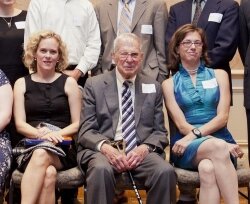 Ernest "Boots" Mead with two of this year's endowment recipients tapped to carry on his legacy: Martien Halvorson-Taylor, left, from religious studies, and Bonnie Gordon from the music department.COLE GEDDY/UVA PUBLIC AFFAIRS
Ernest "Boots" Mead with two of this year's endowment recipients tapped to carry on his legacy: Martien Halvorson-Taylor, left, from religious studies, and Bonnie Gordon from the music department.COLE GEDDY/UVA PUBLIC AFFAIRS -
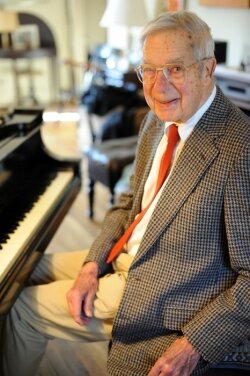 Ernest Mead, 93, has been playing the piano since he was four years old.FILE PHOTO BY JEN FAIRELLO
Ernest Mead, 93, has been playing the piano since he was four years old.FILE PHOTO BY JEN FAIRELLO -
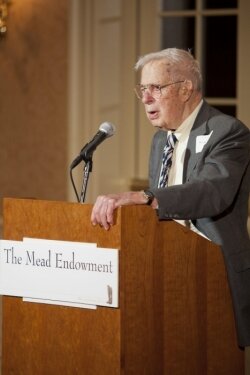 When a former student called Mead to tell him about the endowment and said, "Mr. Mead, there's something you should know about," Mead confesses his first thought was, "Oh my Lord, who's gotten in trouble now?"COLE GEDDY/UVA PUBLIC AFFAIRS
When a former student called Mead to tell him about the endowment and said, "Mr. Mead, there's something you should know about," Mead confesses his first thought was, "Oh my Lord, who's gotten in trouble now?"COLE GEDDY/UVA PUBLIC AFFAIRS -
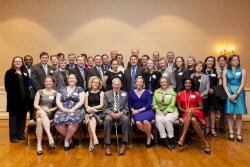 Walking in his footsteps: More than 90 UVA professors previously have received grants of up to $3,000 from the Mead Endowment, and they're required to report back on their projects. Many showed up at the 10th-anniversary celebration.COLE GEDDY/UVA PUBLIC AFFAIRS
Walking in his footsteps: More than 90 UVA professors previously have received grants of up to $3,000 from the Mead Endowment, and they're required to report back on their projects. Many showed up at the 10th-anniversary celebration.COLE GEDDY/UVA PUBLIC AFFAIRS -
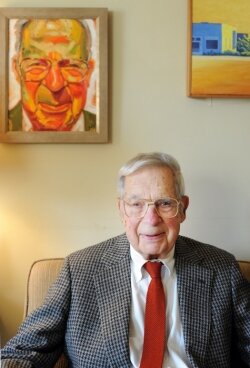 Artist Matt Kleberg's iconic portraits of Mead are all over town-- and in Mr. Mead's living room.FILE PHOTO BY JEN FARIELLO
Artist Matt Kleberg's iconic portraits of Mead are all over town-- and in Mr. Mead's living room.FILE PHOTO BY JEN FARIELLO
When Greg McLean, University of Virginia Class of '95, had chemotherapy over the summer he was an undergrad and then insisted he was returning to school, a professor said, "Why don't you live with me?" What's extraordinary to McLean even today is that the professor didn't seem to see anything unusual about opening his home for several months to an immune system-compromised student.
And that's just one example of the profound influence UVA Professor Ernest "Boots" Mead has had on his students, so much so that more than 100 of them got together and created an endowment in his name.
That sort of grassroots homage is pretty rare, but the students upon whom Mead cast a spell during his decades-long career have raised $1 million to fund "Dream Idea" grants for faculty and pass the torch of the Mead model they so cherished during their time at the University.
The Mead Endowment celebrated its 10th anniversary last month, and the September 17 Alumni Hall bash brought together this year's 11 Dream Idea faculty recipients, many of the 90 previous recipients, and many of the 150 or so former students who have contributed from $100 to more than $50,000 in his honor.
And of course there was the 93-year-old Mead, professor emeritus of music, still enjoying a glass of wine, still enjoying his former students.
"He dramatically enhanced my experience at the University," says Tom Darbyshire, Class of '82, the founder and chair of the Mead Endowment. "And there are so many us. We became friends. His house was like an inn."
To Darbyshire, Mead embodies the Jeffersonian ideal that put students and faculty together on the Lawn. Mead's method of engagement? "He didn't spend time telling what he knew," explains Darbyshire. "He asked what we were interested in."
As the University got larger with more pressure on faculty to publish, the Mead acolytes felt the school was in danger of losing faculty connections to students, Darbyshire explains. So the awards recognize junior professors to let them know they're valued, and, says Darbyshire, to give them "a little push to get them out of the classroom and into the lives of students."
For example, the music department's Richard Will, one of the endowment's early recipients, wanted to start weekly bluegrass/roots jam sessions, culminating with an Appalachian music festival. That Dream Idea was so successful that it continues today, funded by the music department. "He'll tell you," says Darbyshire, "that he wouldn't have done it without the Mead Endowment."
This year's recipients include another music department prof, Bonnie Gordon, who wants to pair 10 students with 10 third- and fourth-graders from the less-than-affluent Westhaven neighborhood to take them to concerts.
The awards go far beyond Mead's former department of music. At the Darden School of Business, Greg Fairchild will work with students to come up with entrepreneurial training for soon-to-be-released inmates. Math professor Christian Gromoll will use his Mead grant to combine math and beekeeping. Biology prof Sarah Kucenas will host eight to 10 young women at monthly dinners with other female scientists.
"Students are hungry for this kind of contact with faculty," says Darbyshire. And that's something the University now recognizes and embraces, he adds.
Another of Mead's skills was as a matchmaker. "He'd pull out something interesting about you and say, 'I know who you should talk to,'" recounts Darbyshire. "I owe my career to him." Mead suggested he talk to someone in Darden, and now the former student works for BBDO, the world's largest ad agency.
"The students have taught me so much," says the characteristically modest Mead says. "I feel like a member of the group." He says he feels honored by the endowment and notes that he has nothing to do with choosing who gets the awards.
As for his secret? "I think it's so important for the teaching process to get outside the classroom," says Mead. "This exchange stimulates the creativity and individuality of the student."
Mead encourages students to go out on a limb intellectually, and sometimes they do that literally, as well. Students from Mead's Liberal Arts Seminar, which he still teaches, were over at his house for dinner, and afterward, they climbed the Norwegian maple in his front yard. "It was symbolic," he says, "of not being inhibited."
Apparently that's a lesson that sticks, at least with Mr. Mead's students.
1 comment
Strange- no one has anything to say about this................no vitriol!
Nice article Ms. Provence.